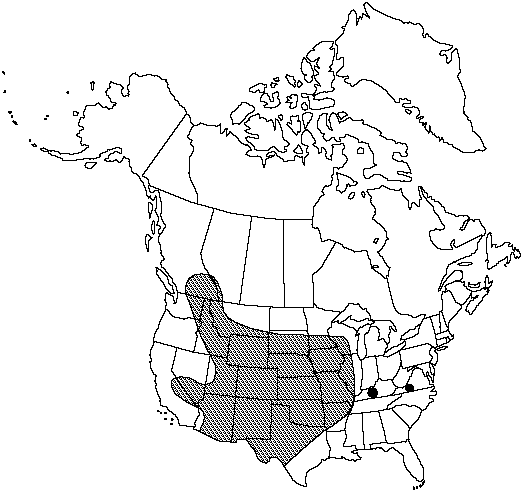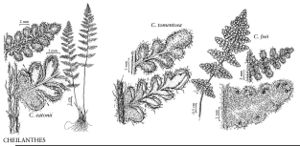Difference between revisions of "Cheilanthes feei"
Index Fil. 38. 1857.
imported>Volume Importer |
imported>Volume Importer |
||
| Line 51: | Line 51: | ||
|publication year=1857 | |publication year=1857 | ||
|special status=Illustrated | |special status=Illustrated | ||
| − | |source xml=https:// | + | |source xml=https://bitbucket.org/aafc-mbb/fna-data-curation/src/2e0870ddd59836b60bcf96646a41e87ea5a5943a/coarse_grained_fna_xml/V2/V2_456.xml |
|genus=Cheilanthes | |genus=Cheilanthes | ||
|species=Cheilanthes feei | |species=Cheilanthes feei | ||
Latest revision as of 20:23, 5 November 2020
Stems compact to short-creeping, usually 4–8 mm diam.; scales often uniformly brown but at least some on each plant with well-defined, dark, central stripe, linear-lanceolate, slightly contorted, loosely appressed, persistent. Leaves clustered, 4–20 cm; vernation circinate. Petiole dark brown to black, rounded adaxially. Blade linear-oblong to lanceolate, 3-pinnate at base, 1–3 cm wide; rachis rounded adaxially, lacking scales, with dense monomorphic pubescence. Pinnae not articulate, dark color of stalk continuing into pinna base, basal pair usually smaller than adjacent pair, ± equilateral, appearing sparsely pubescent to glabrescent adaxially. Costae brown adaxially for most of length; abaxial scales absent. Ultimate segments round to slightly oblong, beadlike, the largest 1–3 mm, abaxially densely villous with long, segmented hairs, adaxially sparsely hirsute to glabrescent. False indusia marginal, weakly differentiated, 0.05–0.20 mm wide. Sori ± continuous around segment margins. Sporangia containing 32 spores. n = 2n = 90, apogamous.
Phenology: Sporulating late spring–fall.
Habitat: Calcareous cliffs and ledges, usually on limestone or sandstone
Elevation: 100–3800 m
Distribution

Alta., B.C., Ariz., Ark., Calif., Colo., Idaho, Ill., Iowa, Kans., Ky., Minn., Mo., Mont., Nebr., Nev., N.Mex., Okla., Oreg., S.Dak., Tex., Utah, Va., Wash., Wis., Wyo., n Mexico.
Discussion
Cheilanthes feei is an apogamous triploid of unknown parentage. It has small, beadlike blade segments similar to those of subg. Physapteris, but most morphological characteristics suggest a clear relationship to members of subg. Cheilanthes (T. Reeves 1979). The species is most often confused with C. parryi, from which it can be distinguished by its thinner, sparser pubescence and smaller ultimate segments.
Selected References
None.
